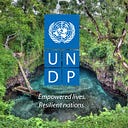Bright future for Digital Transformation in Samoa
Written by Laufaleaina Lesa, Communications Analyst, UNDP Samoa
“Moodle is easy to access and I can confidently navigate it, it’s readily available and overall very helpful for my studies,” said Okesene Moananu, a Year 13 student, and Head Boy for one of the country’s premier educational institutions, Samoa College.
Digital Transformation Project — about making a difference
Samoa College is one of seven schools in Samoa that are part of a pilot project to support the digitalisation of governments and local solutions for COVID-19 response in Samoa.
About 1,000 students are impacted by this project which aims to strengthen the enabling environment for digital development through enhanced e-Governance platforms and e-Learning management systems (LMS) at educational institutions in response to unprecedented disruptions caused by the COVID-19 crisis.
The project, titled, Digital Transformation through enhanced E-Governance Platforms and Digital Literacy, hopes to achieve this by:
i) provision of hardware, software, and hybrid connectivity infrastructure
ii) strengthening existing open-source LMS
iii) improve accessibility options for business continuity, and
iv) digital literacy capacity building.
Moodle — more than just an online platform
Moodle is a learning platform designed to provide educators, administrators and learners with a single robust, secure and integrated system to create personalised learning environments.
It has proven to be a lifeline for many students and teachers around the world, including the classrooms of Samoa, especially during State of Emergency restrictions as were seen sometimes during the height of the COVID pandemic in 2020.
The platform works best when the teacher and students both play their part — the teacher to upload all the required learning materials online so that students can access them, and students to make use of these resources.
“Moodle is great as a backup for our notes, especially for Arts students like myself who have heaps of notes. It’s safe, secure and well organised,” said Mareta Malifa, Head Girl of Samoa College.
Digital Transformation
Digital transformation stands as one of UNDP’s three priority areas to develop smart islands under the upgraded SIDS Offer. With inclusive governance as a strategic focus area of UNDP’s programming portfolio, this project aims to strengthen the enabling environment for digital development through enhanced e-Governance platforms and e-Learning management systems (LMS) at educational institutions.
This will contribute towards the Government of Samoa’s vision of placing Samoa as a knowledge hub in the Pacific region — key outcome 11 of the Strategy for the Development of Samoa (SDS) seeks to “develop e-Governance services, improve information sharing services and increase access to e-Education and e-Health services by individuals, rural communities and vulnerable groups”.
During times of crisis like the COVID-19 pandemic, digitalisation has been proven a paramount priority to support the Government’s public service delivery. Education services had been critically disrupted following the protracted school closures under the State of Emergency orders last year, and in the absence of e-learning tools, the learning of children and youth were severely disrupted, with the more disadvantaged being disproportionately affected due to limited home-schooling resources.
This pilot is conceived to leverage digitalisation efforts to provide a window of opportunity for educational institutions to harness and use complementary tools to support teaching and learning processes, hence create a more resilient, digitally savvy and inclusive knowledge societies that are capable of buffering risks in the face of current and future crises.
Under this pilot project, local expertise is employed through partnering with the Samoa Information Technology Association, to ensure the continuity of education services through the e-delivery of school curricula in light of State of Emergency restrictions, fostering the adoption of ICT in the everyday toolkit at different education levels to “leave no one behind” in the provision of quality education (SDG 4).
Under the project, a free and open-source LMS was established in each participating school. Moodle was selected as the appropriate LMS platform for secondary level teachers and students because it is currently being used at both the National University of Samoa and the University of the South Pacific, meaning that where students are well-versed in its use, a smooth transition between secondary and tertiary education could be achieved.
To increase the uptake of this emerging technology, the project recommends the introduction of e-Learning into early stages of education to also create a strong nexus with the Knowledge Platform to be developed under the Samoa Knowledge Society Initiative (SKSI).
To facilitate the digitalisation of learning, UNDP and SITA envision the digital capacity building of teachers and students as paramount to support such a transition. For instance, teachers need to be trained on uploading and updating the school curriculum and course content onto these LMS platforms. In order for the training and workshops to take place, however, there is a need for the infrastructural base (i.e. hardware, software, connectivity) to be first established. Equipping SITA with immediate ICT equipment provision, therefore, is vital to meet such infrastructural and security requirements and create an enabling environment to test and train users on the e-learning platforms.
The outcome of the pilot will identify recommendations to develop and upscale the use of a nation-wide e-learning platform ultimately made available to MESC, along with step-by-step manuals for teachers on how to set up, maintain and administer quality education through e-learning services, to ensure uninterrupted e-delivery of education services throughout 300 schools in Samoa. Successful practices will provide foresight for scale-up and replication across the Pacific region as well as SIDS-to-SIDS exchange.
ENDS
